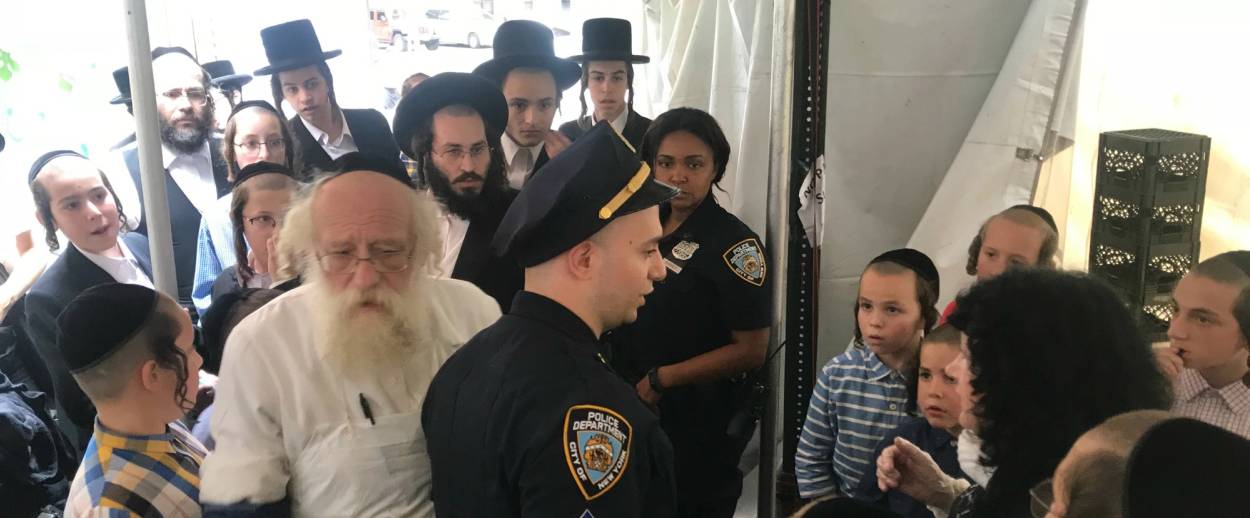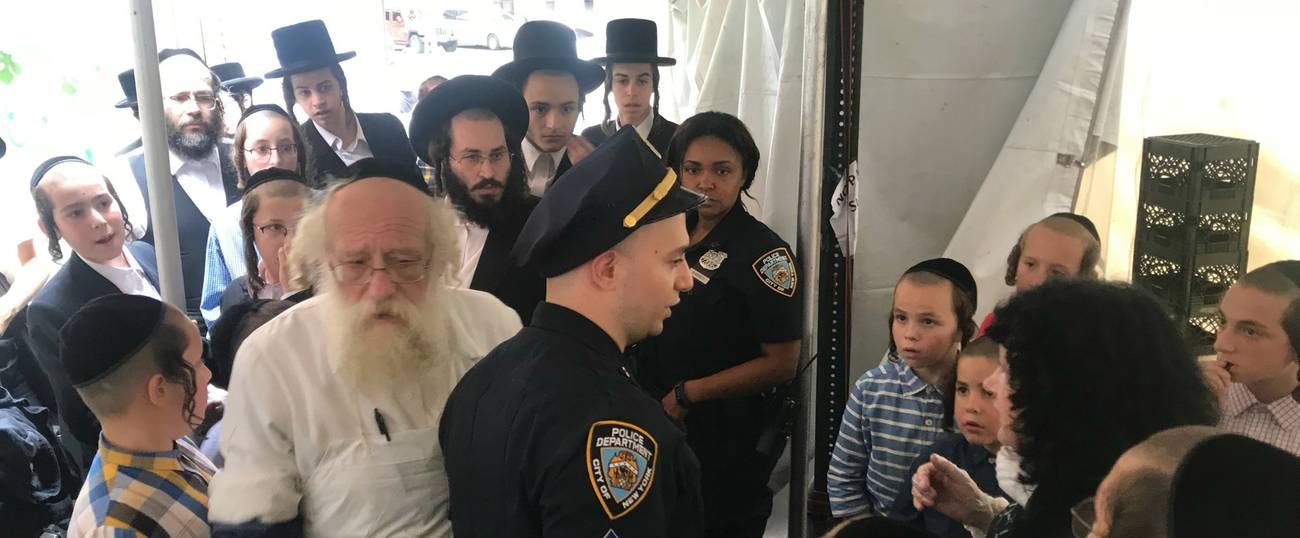Chicken Blood Is Everywhere!
The moral and legal case against kapparot




For the past 26 years, Rina Deych has protested the ritual slaughter of chickens.
Each year, in the days between Rosh Hashanah and Yom Kippur, over 50,000 chickens are killed in pop-up slaughterhouses on the streets of Brooklyn (as they are elsewhere around the world) during a ritual called kapparot, in which some Hasidic Jews wave chickens over their heads exactly three times and then slaughter the chickens. The practice has often been explained as a symbolic transfer of human sins onto the birds, but some rabbinic authorities say that the ritual doesn’t absolve participants, it only inspires them to repentance. In either case, the chickens are kept in crowded crates and often unfed in the days leading up to the ritual; some die before kapparot even takes place.
Deych, a 61-year-old nurse, heard about the ritual from her grandfather, an animal-loving ultra-orthodox kosher butcher who rescued dogs, cats and rabbits in his spare time.
“My grandfather said it’s a crazy thing. The way he said it I thought that it had stopped. I thought it disappeared where it started – in the Middle Ages. It never occurred to me that it was still going on,” Deych said.
In 2010, Deych helped found a group called the Alliance to End Chickens as Kaporos, using an alternate spelling for the ceremony. Deych’s organization is a subsidiary of the fowl rights group United Poultry Concerns, a national non-profit.
Deych’s New York-based organization lobbies the city to prohibit the killing of chickens for kapparot both on animal cruelty grounds and because it’s a health hazard.
“We start politely with letters and petitions and peaceful demonstrations, and when we don’t get anywhere, we escalate,” said Donny Moss, an organizer with the Alliance.
Alliance members protest kapparot year-round. In March, they protested in the lobby of the headquarters of the Department of Health. Activists lay on the floor and called out New York City’s then Health Commissioner, Mary Bassett. “Chicken blood is everywhere! Mary Bassett doesn’t care!” they chanted.
In the days leading up to the ritual this year, about 25 animal rights activists combed the streets of Williamsburg, trying a different approach from years past: care.
“This year, our focus isn’t on the practitioners as much as it is on providing care for the chickens in the last days and hours of their lives,” said Moss. Activists went from white tent to white tent in Williamsburg, giving bread and water to crated chickens.
Reactions varied in Williamsburg’s Hasidic community. Some onlookers looked stunned as the poultry caregivers walked down Bedford Ave, others ripped up pamphlets distributed by the activists. One woman said she would speak with her rabbi about making sure the chickens were at least fed and given water before the ritual.
The cultural chasm between protestors and practitioners runs deep. In an area of Williamsburg made up mostly of Satmar Hasidim, Joseph Mausk looked on as protestors fed chickens. “I do understand their argument. But it’s been an acceptable thing for thousands of years,” he said.
Harry Ungar, 66, a kosher butcher in Williamsburg, tried to tell activists that he treats his chickens well. “I hold the chicken like you hold a baby,” Ungar said, scooping a chicken out of a crate and holding it by its breasts as opposed to its wings, which activists object to. Even at Ungar’s, where protesters said the conditions for the chickens were better, two chickens were found dead and rotting in crates during a five-minute inspection by activists. Police and Hasidic schoolchildren looked on confused as the protestors and Ungar argued.
In 2015, the Alliance took New York City to court, seeking to compel the Department of Health and the Police to enforce laws they claimed are routinely broken during kapparot.
State law forbids unlicensed slaughterhouses, animal torture or leaving animals dead in the street. City law forbids the “throwing or putting” of any animal blood or matter into any public street or sewer. Not only do the activists argue that the city turns a blind eye to health code violations and animal cruelty laws, which appear to be openly flouted during kapparot, they say the police department actively aids practitioners.
The activists lost the 2015 court case when the court ruled that the NYPD’s job is inherently discretionary, meaning the court cannot require, via a writ of mandamus, that the police enforce certain laws.
The Alliance has appealed the ruling to New York’s highest court, the Court of Appeals, which will hear arguments in October.
When asked what he thought of kapparot, a 12 year-old child from a small Hasidic called Vien, shrugged and said, “freedom of religion.”
But in the court’s ruling on kapparot, freedom of religion and animal sacrifice go largely unmentioned.
Animal sacrifice is not, as it happens, entirely forbidden in the United States. The Supreme Court has upheld ritual killings of animals for religious purposes in certain cases as legal.
In a landmark ruling in 1993, Church of the Lukumi Babalu Aye v. City of Hialeah, the Supreme Court ruled that a Florida City Council could not enact new laws that specifically targeted the Santeria religious minority and their practices, which included animal sacrifice.
The laws passed by the Hialeah City Council were expressly written to illegalize the Santeria adherent’s practices, which the city council deemed “inconsistent with public morals, peace or safety.”
The Alliance, however, argues Lukumi is irrelevant in their case, as laws have not been created specifically targeting the Hasidic community’s’ practices. They simply want existing laws enforced.
For their part, Hasidic Jews have their own internal disagreements over the practice. Yonassan Gershom, a Bresov Hasidic rabbi has made videos denouncing the use of chickens as kapparot, suggesting that his fellow Hasidim should use coins instead, which could then be donated.
For the moment, protestors and practitioners are an impasse, with the activists, unable to win their case in court, “caring” for doomed chickens.
Noah Goldberg is a freelance reporter based in New York covering crime, local politics, and breaking news, mostly for the New York Daily News. You can follow him on Twitter @Noah__Goldberg.